#IWD2022: Celebrating the Power of Women to Create a Healthier, More Equitable World
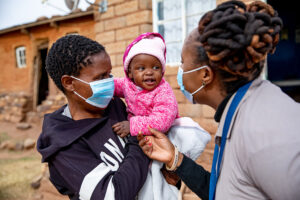
Mentor Mother Liako Serobanyane (right) with clients in Lesotho
“What comes in my head when I walk around this community is that I am empowering my community. I am making a change. Yes. That is what drives me every day when I wake-up. I know that I’m serving my purpose.” – Liako Serobanyane, Mentor Mother, Lesotho
Today on International Women’s Day, mothers2mothers (m2m) is celebrating the power of women, like Liako, to dramatically improve the health and well-being of women, families, and communities.
Their efforts are more critical than ever, as many women are at risk of being left behind in the United Nations Global Goal of achieving health and well-being for all. In sub-Saharan Africa, women face profound gender inequity that contributes to serious health challenges. Sub-Saharan Africa has the highest maternal mortality rate in the world (UNICEF), and women and girls are disproportionately impacted by HIV/AIDS (UNAIDS). In addition, only 48% of women (ages 15 to 49) make their own decisions about sexual and reproductive health and rights (UNFPA). COVID-19 has made health disparities worse.
When women lead, communities get what they need
For nearly two decades, m2m has demonstrated the power of local female leaders to respond to the exact needs of their communities and create real and tangible change for vulnerable and marginalised women, children, and families. This ripple effect begins with women like Liako, who are at the heart of our work, employed as frontline health workers called Mentor Mothers. They understand first-hand the barriers to health facing their communities, having overcome their own challenges. Mentor Mothers use their knowledge and experiences to provide health services, and support, educate, and, inspire other women and families in their communities to access medical care and treatment they need and create healthy, thriving futures for themselves and their families.
m2m has reached over 13.5M people with life-changing health services and education across 12 African nations since 2001, and created more than 11,500 quality jobs for women living with HIV as frontline health workers. Over those years, Mentor Mothers have unlocked remarkable results for their communities and themselves—including keeping more than 1.1 million women alive since 2001, who might otherwise have been at increased risk of maternal mortality. They have also helped more than 4.3M adults stay HIV-negative since 2013, and achieved virtual elimination of mother-to-child transmission of HIV among their enrolled clients for seven consecutive years.
This success shows that a healthier, more equitable world is possible when we invest in women, and put communities at the centre of solutions. It is a roadmap for achieving the global goal of health for all by 2030 and ensuring no one is left behind.
To celebrate the achievements of women on IWD, we asked m2m Mentor Mothers about the change that they are helping to create every day in their communities:
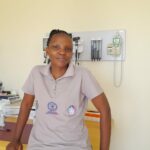
Neile Mabea
Neile Mabea – Maternal Child Health (MCH) Nurse, Lesotho
The emergence of chronic and life-threatening illnesses, like cervical cancer, make our clients live in fear and feel hopeless. When I first met these clients, they did not want to screen for cervical cancer due to the fear that they might be diagnosed with another life-threatening illness while they are already living with HIV.
But after my fellow MHC nurses and I ›explain the importance of early screening for cervical cancer, most of them are willing to screen. Then, it gets to the point that they sometimes remind the nurses when they are due for screening, and even encourage each other to screen for cervical cancer and get tested for HIV. We have empowered them to take the initiative and be in charge of their health.
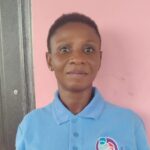
Juliana Narh
Juliana Narh – Community Mentor Mother and Early Childhood Development Coordinator, Ghana
Ghana has one of the highest levels of HIV-related stigma. Some of our clients refuse to accept their HIV status due to fear of being discriminated against.
Cultural and religious beliefs play a part in that. We also have to constantly address the myths around HIV. There is a lot of false information in our country.
As Mentor Mothers, we are combat-ready to demystify these myths. We arm our clients with the latest information and guidelines about HIV so that they can make better choices and take control of their lives regardless of their HIV status. In the health centres and communities, we are seeing positive changes in terms of stigma.
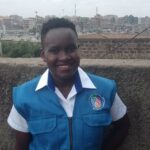
Ruth Adhiambo
Ruth Adhiambo – Community Mentor Mother, Kenya
Young women come to Mentor Mothers to ask about sexual health-related issues. We teach them about the importance of using a condom. Most of them don’t know how to properly use a condom, and we educate them about that. We also talk to them about the dangers of teenage pregnancy, and the phenomenon of ‘blessers’ or inter-generational sex, where young women sleep with older, mostly rich men for material benefit and money.
After we speak to them, they change their behaviours and focus on school because now they have a very important tool in their disposal—knowledge. They listen to me because I am of their age and I tell them about my personal journey and the mistakes I have made. When talking to me they are able to share their opinions and problems without any fear of being judged. They see me as their role model.
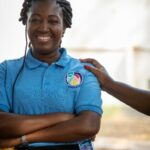
Faustina Ocansey
Faustina Ocansey – Site Coordinator, Ghana
Most parents or caregivers have no idea of the importance of early childhood development and how to help their children reach their development milestones before meeting m2m.
After I teach them the benefits of early stimulation, I see great changes. The parents play more with their children and make colorful homemade toys for them. The children are stimulated, active, and most of their key milestones are met.






















